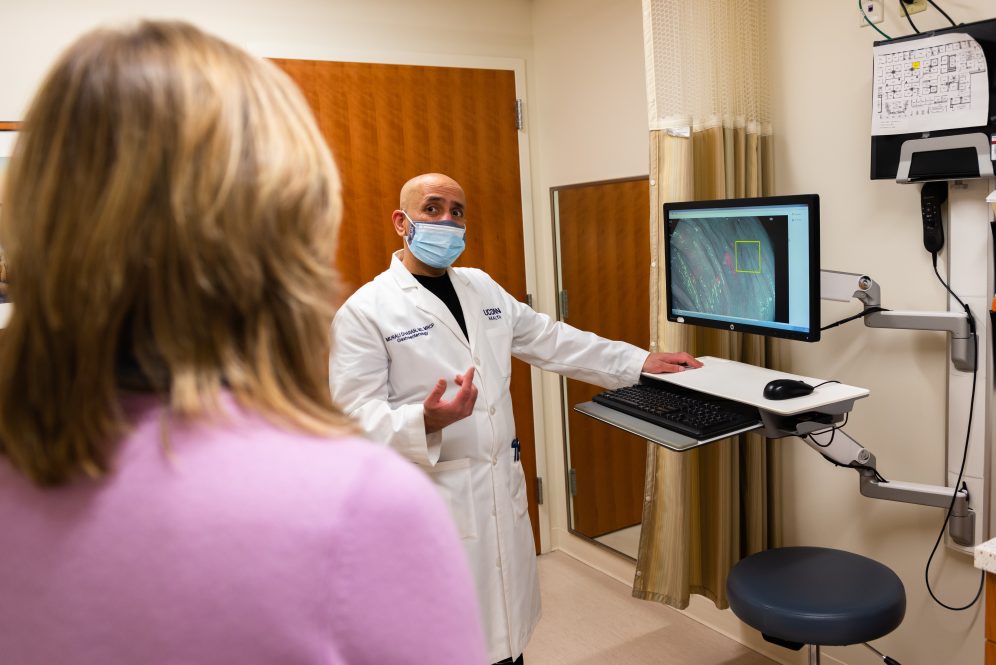In a year marked by painful losses, movie fans have another reason to grieve: Chadwick Boseman, the star of the popular film “Black Panther,” died Aug. 28 at age 43, following a four-year battle with colon cancer.
Boseman was among a growing number of young adults to be diagnosed with colon cancer, a condition once regarded as an older person’s disease.
This year, the American Cancer Society estimates that 12% of all new colon cancer cases, approximately 18,000 people, will be diagnosed in patients younger than 50. Compared with non-Hispanic whites, Black patients are 20% more likely to develop colon cancer and nearly 40% more likely to die from it.
This rapid increase is especially puzzling because the rate of colorectal cancer has plummeted among older adults—largely due to regular colonoscopies and lower rates of smoking.
Colorectal cancer arises from the inner lining of the large intestine, also known as mucosa. It usually begins as an abnormal growth, or polyp, that forms in the colon or rectum. Symptoms might not be readily apparent; rather, they show up as the disease progresses.
“Defining the causes and risk factors for early-onset colorectal cancer will likely help inform approaches for prevention, screening, and treatment,” says Dr. Joel Levine, M.D., co-director and founding director, Colon Cancer Prevention Program at UConn Health.
Experts don’t know what’s causing the jump in colorectal cancer among young adults. But they do know some factors that raise the risk of colorectal cancer in older adults, including obesity, physical inactivity, and smoking.
“Colon cancer is a leading cause of death in the U.S. because when it is detected late, it is very difficult to treat, says Dr. Murali Dharan, director of the Advanced Endoscopy Program at UConn Health. “That’s why prevention is key.”
Unhealthy diets have become more common in past decades and the number of children and adults who are overweight or obese continues to climb.
“We do a good job detecting colon cancer, but what we really need to do is look at who is at risk and begin prevention early in life,” states Levine. “Looking at prevention vs. detection is key.”
Factors that may increase your risk of colon cancer include:
- Older age
- African-American race
- Obesity
- Diabetes
- A personal history of colorectal cancer or polyps.
- Inflammatory intestinal conditions
- Inherited syndromes that increase colon cancer risk
- Family history of colon cancer
- Low-fiber, high-fat diet
- A sedentary lifestyle
If you have a family history of colorectal cancer, you might benefit from speaking with a genetic counselor or another health professional who is trained in genetic counseling.
Screening can often find colorectal cancer early, when it’s small, hasn’t spread, and might be easier to treat. Regular screening can even prevent colorectal cancer. A polyp can take as many as 10 to 15 years to develop into cancer. With screening, doctors can find and remove polyps before they have the chance to turn into cancer.
Stool DNA testing is intended to screen for colon cancer or precancerous polyps in people with no symptoms. The stool DNA test is a noninvasive laboratory test that identifies DNA changes in the cells of a stool sample. The test detects abnormal DNA and small amounts of bloodshed into the stool from colon cancer or colon polyps.
Research shows the stool DNA test is effective at detecting colon cancer and precancerous polyps. A positive test result usually requires a colonoscopy to examine the inside of your colon for polyps and cancer.
A colonoscopy is often the recommended screening for colon cancer. For this test, the doctor looks at the entire length of the colon and rectum with a colonoscope, with a light, and small video camera on the end. It’s inserted through the anus and into the rectum and colon. Special instruments can be passed through the colonoscope to biopsy or remove any suspicious-looking areas such as polyps if needed.
Boseman’s premature death is tragic, and one we hope will become increasingly less common over the next five to 10 years. It is important to be aware of potential risk factors and symptoms to detect colon cancer at an early stage.
Please see a doctor if you are concerned about colon cancer symptoms, preferably sooner if you have a family history of the disease. Acting quickly can potentially save your life.



